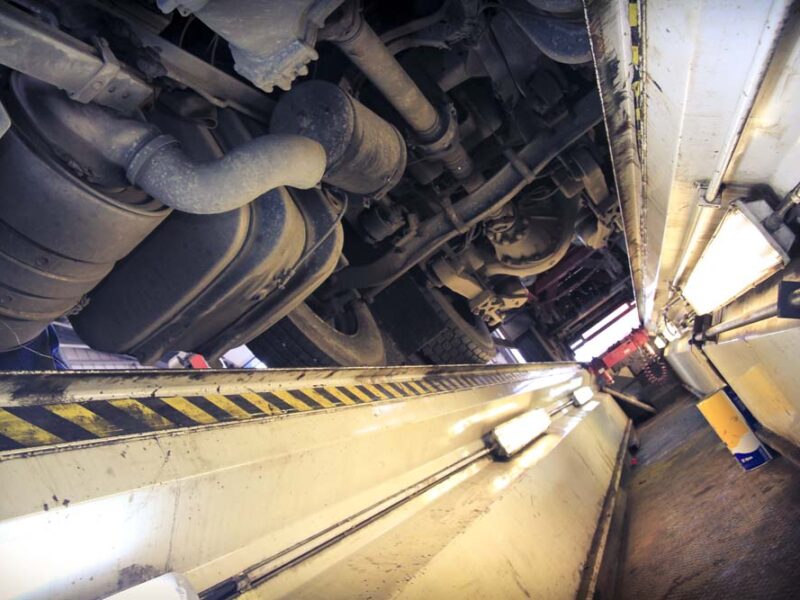Here is the latest round up of updates from the Traffic Commissioners' Office:
The latest update to the Senior Traffic Commissioner's COVIS-19 guidance for goods and passenger vehicle operators has been published, with the updated version of the document available here.
This new update focusses on two primary areas - first, a change in relation to the position that the DVSA vehicle examiners are adopting when it comes to the issue of roadworthiness prohibitions - and second, the latest in relation to the position the OTC itself is adopting on Public Inquiries.
Roadworthiness Prohibitions
Previous versions of the Guidance have included provision in limited COVID-enforced circumstances for operators to extend the stated regular safety inspection interval, whilst making it clear that road safety should never be compromised. The rationale for this temporary relaxation is recognition that access to maintenance facilities is highly likely to be restricted for as long as the government's social distancing and 'lockdown' measures remain in place.
For similar reasons, the DVSA has confirmed changes to the approach to be taken in relation to the issue of roadworthiness prohibition notices in certain circumstances.
Firstly, the DVSA has confirmed that it will not take any enforcement action for vehicles found operating with 'in-service reported' non-safety critical defects in circumstances where necessary parts and/or access to workshops are unavailable (operators are encouraged to consult the HGV and PSV inspection manuals for clarification on what constitutes a 'minor' or 'major' non-safety critical defect). However, operators should note that:
- No vehicle or trailer may be used with a serious or dangerous defect;
- Operators need to keep records on vehicle maintenance files explaining and evidencing why any repairs have needed to be deferred; and
- Any judgement regarding a vehicle's suitability to be used in service must be made by a suitably qualified technician.
Secondly, the DVSA has confirmed a suspension on the issue of delayed roadworthiness prohibitions: instead, any defects will be reported on an inspection notice, with a requirement for the operator to retain documentary evidence that any reported defects have been rectified in a timely manner.
Finally, the DVSA has also indicated that in certain circumstances, where a prohibition has been issued, it may be possible for the prohibition to be removed based upon the electronic supply of evidence that defects have been rectified, together with a new regular safety inspection report being provided (i.e. without the usual requirement for the vehicle to be subject to a DVSA inspection to remove the prohibition).
Public Inquiries
The previous version of the Guidance confirmed that if a Public Inquiry (or Driver Conduct Hearing) was to be adjourned, the operator or driver concerned would be notified.
The updated position, as set out in the latest version of the Guidance, is that no face-to-face hearings are presently being conducted while the virus outbreak continues, and any public inquiry which had been listed prior to 20th March 2020 has already been postponed.
Traffic Commissioners will have road safety issues firmly in mind, and where an immediate risk is identified, they will consider calling and holding a Public Inquiry.
Similarly, the Traffic Commissioners may decide to call 'virtual' hearings in appropriate cases where applications or outstanding regulatory matters are deemed capable of being dealt with via video-link.
Operators should not assume that any pending public inquiry will be held in abeyance until after the Covid-19 pandemic and present restrictions have been lifted: your case may be one of those that the OTC deems appropriate to be dealt with via video-link, and it will pay to be prepared.
If you have been called up to a Public Inquiry and need advice or representation, please get in touch with us on 01279 818280 (Mobile: 07912 073994) or click here to send an email.
11th May 2020

More News and Insight

Social Media – Have you Thought about your Employees’ Use?
Social Media is all encompassing in the modern world, but although it brings many positives, it can place employers in vulnerable positions if their employees’ use is not carefully defined…

Changes to the Clandestine Entrant Civil Penalty Scheme means a Stitch in Time Really Does Save Nine!
The Clandestine Entrant Civil Penalty Scheme has been in place for over 20 years. It is designed to complement law enforcement activity against criminals who smuggle people into the UK illegally as well as deter those who decide to try to enter the country without permission…

Driving in the UK? Read about the latest Rule Changes in 2024
Earlier this year various new driving laws were introduced, impacting both standard road users as well as HGV and PSV road users across England, Wales & Scotland. If you are driving in the UK, especially if you are a commercial driver, then you should ensure that you are aware of these amendments and new rules…

Self-Driving Cars on UK Roads to be Reality by 2026
It seems that one of the first areas that will be breaking the ground in the AI revolution into most people’s everyday lives will be Self-Driving cars! Of course we have heard all this before, and more than once!

Are You Taking your Responsibilities to Maintain your Vehicles Seriously?
Running a haulage business is not an easy undertaking. There are a multitude of decisions to be made on a daily basis before any driver actually gets behind the wheel and delivers the goods (or passengers!).

Update to the Guide to Registering & Operating Local Bus Services in England & Wales
The Senior Traffic Commissioner’s guide to registering and operating local bus services in England and Wales is intended to help operators of local bus services understand the requirements for registering a service.

Changes to the HGV & PSV Test Regime for Earned Recognition Operators
In March 2021 the Government began a review into the processes for commercial vehicle testing to look at ways it could improve the regime for operators whilst still maintaining high safety standards for any vehicle used commercially on the UK’s roads.

Employment Law Updates for 2024
The Government has confirmed several legislative employment law changes to be implemented 2024, which aim to bring about a “fairer workplace for employees”.

Campaign to Bar Schools from using Section 19 Permits
In March 2024 a campaign was started to end the operation of minibuses by schools and colleges under Section 19 permits.

Moving to a Digital First Approach in Heavy Vehicle Testing
The DVSA has published an update to their digital transformation project for heavy vehicle testing. The update is for the new Manage Your Vehicle Testing (MyVT) digital service across vehicle testing.

Traffic Commissioner Highlights Abuse of Section-19 Permits
In a Section 19 Public Inquiry hearing heard last year (2023) the Traffic Commissioner highlighted again the importance of permit operators ensuring that their vehicles allow passengers and other road users to be safe.

Enero Logistics Ltd – the Law for Operators on Agency Drivers
At one time or another, many transport companies need to rely on the services provided by agency drivers, to best cope with sudden fluctuations in demand or to fill driver shortages. This allows for the undisrupted continuation of services by these organisations.
